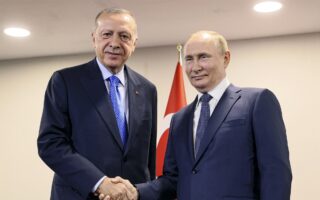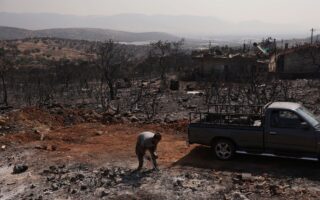Energy security and geopolitics

The explosion of violence in Israel and Gaza has compounded the challenges already caused by the climate crisis, Russia’s invasion of Ukraine, hostilities in the Southern Caucasus region and the production and supply chain problems, high prices and inflation, all long-term symptoms of the pandemic. Energy security has become a major concern for all countries.
This was one of the issues discussed at last year’s Greek-British Symposium in Nafplio. This year, “Energy Security and Sustainability in Europe” is the overall theme of the dialogue between Greek and British politicians, academics and experts from various fields, including energy companies and banking. The aim of the symposium, since its inception in 2017, is to explore ways for the two countries to strengthen their already close ties in an increasingly complicated world, to the benefit of both. Britain’s leaving the European Union has made bilateral connections even more important and the symposium works towards keeping channels open in many sectors, connecting people, identifying problems, making proposals.
Even before the surge of violence in the Middle East, the war in Ukraine and sanctions against Russia posed major challenges in ensuring energy supplies while also transitioning towards ending CO2 emissions. Now efforts to find alternative supplies from our region may be affected by Israel’s freeze on energy deals. Greece and Cyprus have been working with Israel, Egypt and others towards large energy projects aimed at making the Eastern Mediterranean an alternative supplier for Europe in gas and electricity. These include transporting Israeli gas to Europe and power corridors for green energy, such as the EuroAsia Interconnector and Saudi Greek Interconnection (which might have included Israel if the normalization of ties with Saudi Arabia went ahead).
Greece and the UK need to take difficult decisions, and to invest large amounts of money and time, in finding solutions that will secure their energy supply
While Greece is increasing its supply from renewables and is working towards becoming a major energy hub, the UK currently produces energy from nuclear, fossil fuel and renewable sources and needs greater interconnection. Both countries are facing serious challenges and opportunities. They need to take difficult decisions, and to invest large amounts of money and time, in finding solutions that will secure their energy supply and meet the requirement of net-zero emissions. Europe will need alternative gas sources, which may be slow to come on line, and this will affect geopolitics. We have seen this in the case of Azerbaijan, which has spent large amounts of its energy wealth on arms purchases from Turkey. Other major energy suppliers may be unpredictable in the current uncertainty. The question is whether individual countries, or even Europe on its own, can forge effective alliances that will secure energy and help towards the transition to non-emitting electricity generation. Major factors concerning energy sustainability are electricity storage, CO2 capture and storage, hydrogen production, nuclear energy, the transmission of electricity and transportation of gas.
The symposium, which will be held in London on Monday and Tuesday, will cover the changing energy landscape, energy security and geopolitics, sustainability and technology, opportunities for cooperation in energy and the environment. The session on sustainability and technology will be livestreamed at 6.30-8 p.m. Athens time, on ekathimerini.com. Participants are Maria Damanaki, independent adviser on climate-oceans and former EU commissioner for maritime affairs and fisheries; Tim Yeo, chairman of the New Nuclear World Institute and former minister of state for the countryside and environment; Jayesh Parmar, partner, Baringa Partners; and Brendan Barratt, director of Strategic Advisory Services, Mace Group. Cheryl Novak, expert in sustainability and migration at the Hellenic Foundation for European and Foreign Policy (ELIAMEP), will moderate. The rest of the symposium is held under the Chatham House rule, which means that neither the identity nor the affiliation of speakers may be revealed. This allows for wide-ranging discussions, daring proposals and lively questions and answers.
The symposium will begin with a reception at the Hellenic Residence on Sunday. Greece’s defense minister, Nikos Dendias, and Graham Stuart, UK minister of state for energy security and net zero, will speak at the opening on Monday. Christos Stylianides, minister of maritime affairs and island policy, will speak at the formal dinner on “Partnership with Africa: EU and the UK working together.”
The Greek-British Symposium is privately led and funded largely by sponsorships. It is delivered under the guidance of a steering committee, in partnership with the Delphi Economic Forum, with the support of the British Embassy in Athens, the Greek Embassy in London and the British Council. It has been held alternately in Greece and the UK since the first meeting in Nafplio in 2017.





